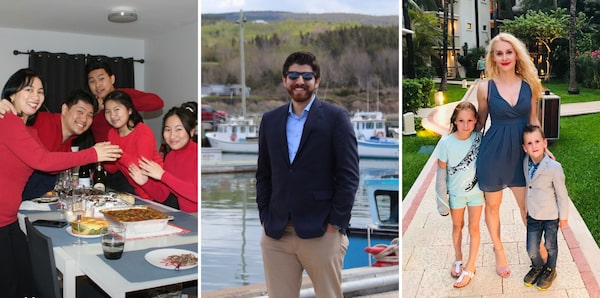
Ellen Hong from the Philippines, Tareq Hadhad from Syria and Maryna Mikriukova from Ukraine are some of the recently sworn-in Canadians who are taking part in a virtual round-table discussion for a cross-country citizenship ceremony on July 1.Handout photos
Every year on Canada Day, dozens of ceremonies take place across the country where permanent residents become Canadian citizens. People gather in a room filled with Canadian flags to sing the national anthem and take the Oath of Citizenship, pledging allegiance to the Queen and committing to follow the country’s laws. But that won’t be possible this year, since the federal government cancelled all citizenship ceremonies, tests and interviews more than three months ago because of COVID-19.
Before the pandemic, the government had planned to accept as many as 371,000 new permanent residents in 2020, a number that will drop dramatically because of lockdown measures. The number of people given permanent-resident status in April dropped by 80 per cent from the same period last year. Around 4,100 newcomers were processed, compared with 26,900 in April, 2019, according to a report by the Montreal-based Association for Canadian Studies.
The government expects a surge in applications when travel restrictions ease. In the meantime, the federal Ministry of Immigration, Refugees and Citizenship, the Institute for Canadian Citizenship, and MaRS Discovery District, which organized a discussion with new Canadians, are resuming some ceremonies. They will play host to Canada’s first cross-country virtual citizenship ceremony on Wednesday. Nineteen people, coming originally from 13 countries, will dial in from a dozen communities across Canada to take their citizenship oaths.
As part of the ceremony, there will be a virtual round-table discussion with new Canadians, who received their citizenship before the country-wide closings were announced. The Globe and Mail spoke with eight of the participants and asked them about their journeys and what advice they would like to share.
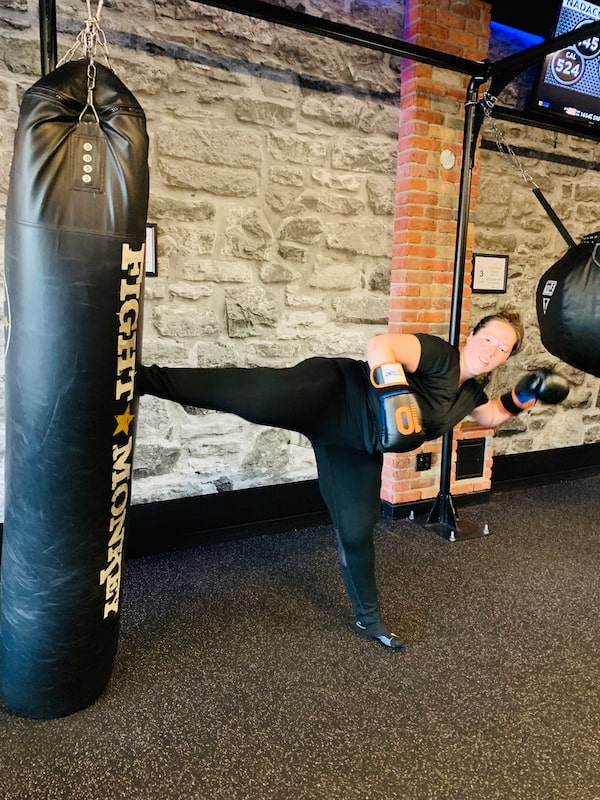
Nada Chamas, an immigrant from Lebanon, is a midwife who kickboxes, an activity she says has helped make her stronger and better at her job.Supplied
Nada Chamas
Originally from Lebanon
Now lives in Montreal
Nada Chamas first came to Canada in 2015 in search of better economic opportunities and political stability. Ms. Chamas, who is 36, had spent nine years working as a midwife in her native Lebanon, where she grew up during the Lebanese Civil War.
She was sponsored by her husband, who lived in Montreal, and admitted to a program of the Ordre des sages-femmes du Québec, which helps foreign-trained midwives qualify to work in the province. Ms. Chamas quickly found employment after completing the program in 2018.
“As soon as I started finding work in childbirth, I started feeling like I belonged to this country,” she said. “Now I can say that I have a good life.”
As a newcomer, Ms. Chamas spent months navigating Montreal with her husband as her only friend. Despite being a francophone – French is widely spoken in Lebanon – Ms. Chamas admits the Québécois accent took some getting used to. “Even if you understand the language, it’s like a different language.” Today, her network is much bigger than just her husband, and she says she feels that Montreal is her home. “I have found my place here.”
Ms. Chamas says she is proud to live in a country that “respects people who do small things for them,” and one where she can live in security. She currently works as a midwife in Montreal’s Côte-des-Neiges neighbourhood. The number of pregnant women under her care has increased now as colleagues have been sent to the nearby Jewish General Hospital to assist during the pandemic.
Her advice to new Canadians is to seek out government programs and community resources aimed at helping newcomers, and to “enjoy the safety that this country has to offer.”
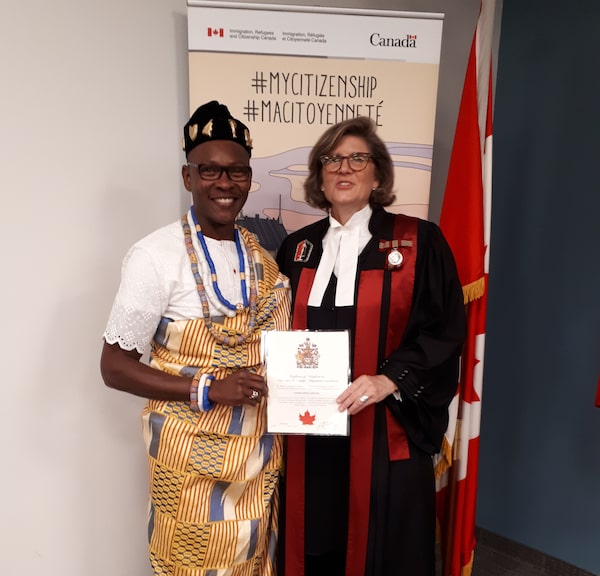
Togolese immigrant Kossivi Amouzou stands with a judge in Ottawa after being sworn in as a citizen last year.Supplied
Kossivi Amouzou
Originally from Togo
Now lives in Ottawa
Kossivi Amouzou is an IT specialist who came to Canada from Togo in 2016 “to discover new cultures.” He says he is proud to live in Canada, a country that is “collectively engaged to the rule of law, to building a free society, that respects its laws, and that is prosperous.” The 43-year-old, whose siblings live across the world, chose to settle in Canada because of these values and because of “it is a country of … opportunities.”
But in light of recent discussions surrounding racism in Canada, Mr. Amouzou recognizes it played a role in his early integration.
He spent his first weeks in Canada living with a friend while completing a skills equivalency program. “I can’t integrate if I am not given a job because of my name, or an apartment because of my name,” he said, describing weeks he spent looking for an apartment with little success. “Your body can adapt [to the cold] after a few months, but when you talk about racism, some people never manage to bear it.”
Mr. Amouzou says he powered through these hurdles because he is an optimist who believed in his “dream of belonging to the Canadian family.”
He eventually found a place to live and a job with great colleagues in Quebec. In 2018, Mr. Amouzou took another leap and moved to Ottawa to perfect his English. He currently works as an IT specialist in the city.
After four years in the country, he is surrounded by good friends and community members from all walks of life. He is happy he chose to move to Canada, and proud he persevered to find his place in society. “You need to have courage and determination because this is a new adventure,” he said to new citizens. “You need to be courageous in order to move forward and stay the course.”
Tareq Hadhad, fourth from right, visits the waterfront at Nova Scotia's Arisaig Provincial Park with his family. He came to Canada as a Syrian refugee.Supplied
Tareq Hadhad
Originally from Syria
Now lives in Antigonish, N.S.
Tareq Hadhad first came to Canada as a refugee in December, 2015. He is originally from Syria, but fled his Damascus home in the aftermath of a bombing that destroyed his father’s chocolate factory in 2012. His family spent two years living in a Lebanese refugee camp before moving to Antigonish, N.S.
Mr. Hadhad, who is 27, quickly learned to love Antigonish thanks to the kindness and welcoming spirit of its residents. “With kindness nothing is impossible. And I think the kindness that has been offered to me has been a significant factor of our transition [in] this country,” he said.
In August, 2016, Mr. Hadhad turned to his family’s chocolatier tradition and help from his new community to launch Peace by Chocolate – a family-run company whose chocolates are now sold by retailers across Canada, and further afield online.
His company’s operations slowed down for some time because of the pandemic, but Mr. Hadhad has found a purpose for Peace by Chocolate during this crisis. “We have a role to play. We produce chocolates; everyone loves chocolate; chocolate makes everyone happy. We want to spread this happiness.”
In April, the company launched a challenge inviting Canadians to share photos or videos showing an act of kindness to win a month’s supply of chocolates. His company also holds partnerships with organizations such as the Canadian Mental Health Association.
Mr. Hadhad says he is proud to live in a country that has chosen “the hard path of democracy.” His advice to new Canadians is to “be positive, be resilient, be kind,” he said. “Share your story, and don’t hesitate to take the first step because it can lead to a big story.”
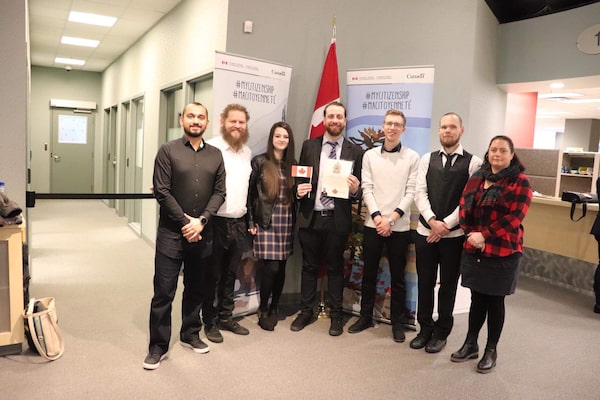
Australian Matthew Stewart, middle, is surrounded by his 'Vancouver family' at his citizenship ceremony this past February.
Matthew Stewart
Originally from Australia
Now lives in Vancouver
Matthew Stewart arrived in Canada in 2013 looking for a fresh start after spending his whole life in Australia, where he worked in the information technology sector. “I wasn’t too happy living there,” said the 38-year-old, describing the culture as more conservative than he would like. He obtained a Working Holiday Visa just before the age cutoff, which allowed him to pursue his dream of travelling in North America and exploring the Canadian scenery.
Soon after arriving on the east coast of Canada, Mr. Stewart booked a ticket a cross-country train trip and took the opportunity to see the land, stopping off in every province along the way. He decided to settle in Vancouver and began working at a downtown hostel, and he has stayed in that job since arriving. The hostel has remained open during the pandemic but has lost a significant portion of its business, which has been stressful on Mr. Stewart and his staff.
While starting a new life and working in an entirely different field was a big adjustment, Mr. Stewart was struck by the open and welcoming nature of Canadians. “In Canada, I just feel more comfortable. I feel as if I’m a part of everything and just much happier.”
Mr. Stewart is also a landscape photographer and has taken time to pursue his passion while visiting scenic places such as the Rockies.
His advice for new Canadians is to take as many opportunities as possible to engage in the community around them. He recommends that newcomers apply for permanent residency even if they don’t think they will be accepted, because “you don’t want to look back later and regret it.”
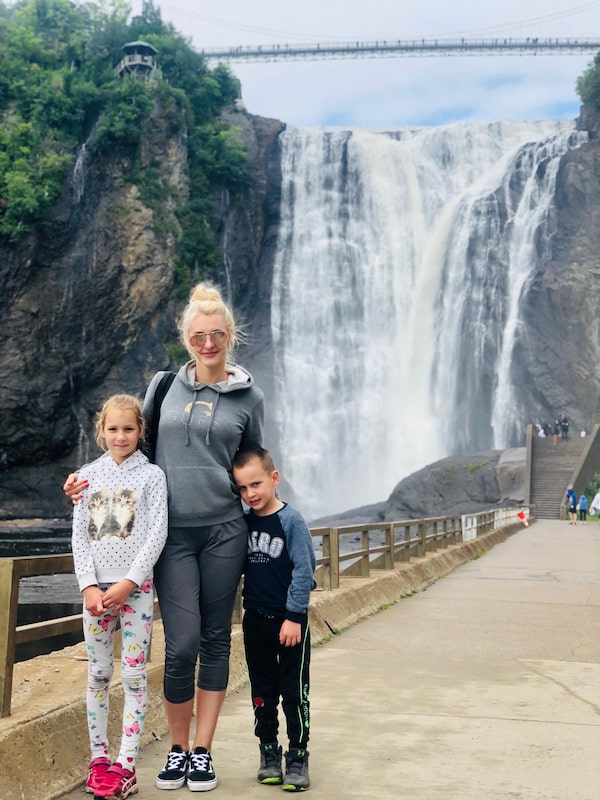
Maryna Mikriukova of Ukraine takes her children on a trip across Quebec last August.
Maryna Mikriukova
Originally from Ukraine
Now lives in Ottawa
Maryna Mikriukova arrived in Canada in 2015 at the age of 30, looking for a safer and more stable country in which to build her life and raise her two young children. She arrived with only a few suitcases, “starting from zero.” Her first few months proved challenging: She was unable to rent an apartment without pay stubs or references, until a “very kind” landlord took interest in her story and rented a place to her and her children. Securing a job and finding child care were also hurdles that she was eventually able to overcome.
Now Ms. Mikriukova, 35, has built a comfortable life for her family. She works in human resources for the federal government, and her children attend a French-language school and many activities with other children in their neighbourhood. Ms. Mikriukova says she is amazed at Canada’s inclusiveness, and how many diverse cultures, nationalities and backgrounds live and work together. She likes to spend her free time enjoying Canada’s natural wonders, and after a trip to PEI in 2019, she hopes to see the Pacific Ocean and the mountains in Western Canada this year if travel restrictions are lifted.
One of the first things Ms. Mikriukova did upon becoming a citizen in 2019 was register to vote. “I was so pumped to use my voting rights right away,” she said. She advises newcomers to be persistent and keep going even when it gets tough. “Never turn your back on your dreams,” she said. “It might take more time and go slower than anticipated, but don’t give up.”
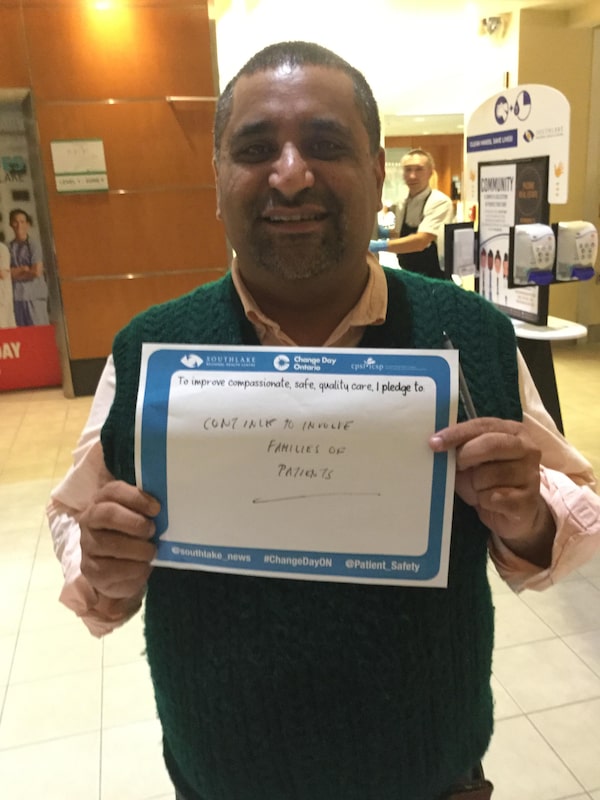
Gaurav Mehta, originally from India, shows his support for a patient-care initiative last year.
Gaurav Mehta
Originally from India
Now lives in Newmarket, Ont.
Gaurav Mehta first arrived in Canada in 2013 with his wife and two sons, to pursue better opportunities in the medical field. The 44-year-old grew up in New Delhi and emigrated to Britain in 2001 where he worked for the National Health Service as a physician. But then came the 2008 recession and he faced losing his job because of health care budget cuts. As many of his colleagues moved away to pursue more stable opportunities, he made up his mind to apply to a job in Canada.
Dr. Mehta is now medical director of psychiatry at the Southlake Regional Health Centre and also an assistant professor of psychiatry at the University of Toronto. Working in health care during the pandemic has given him a strong sense of purpose.
The process to work in medicine in Canada wasn’t easy, he says. The extensive exams forced him to “go back to my medical school days,” which was difficult while working and helping to take care of his young children.
But despite the challenges, Dr. Mehta says he is delighted to be a Canadian citizen. He says Canadian people are warm, family-oriented and the most patriotic people he has ever met. His favourite place to visit is Niagara Falls, where he was “mesmerized by the beauty and feeling of the falls.”
Dr. Mehta encourages new citizens to take an active role in their communities. He also advises them to reach out to the many social services available for newcomers to help them get settled and to learn about Canadian culture.
Ellen Hong, shown at Niagara Falls this past February, moved to Canada from the Philippines with her husband and their three children.Supplied
Ellen Hong
Originally from the Philippines
Now lives in Milton, Ont.
Ellen Hong, aged 47, came to Canada with her husband and three children in August, 2014, to be reunited with her brother and to provide her children with better education opportunities. But it took strength and resilience to make it through the past six years, she said. While celebrating their wedding anniversary during their first month in Canada, Ms. Hong and her husband found themselves stuck at a bus stop in the rain. “We were soaking wet and I was crying and I told my husband that we should just go back to the Philippines where we had a house and cars,” she said. A lack of job opportunities made it difficult to afford those luxuries in Canada.
With 15 years of experience working as a medical technician and physical therapist, she hoped to find a job in the health care industry but was initially told that without any Canadian experience, her credentials did not transfer over from the Philippines. She spent two years working various jobs, including at a fast-food restaurant, a department store and a medical lab, while volunteering at the local hospital. In 2018, Ms. Hong was hired as a medical laboratory technician at Milton District Hospital and is working on the front lines of the COVID-19 pandemic. Her son is following in her footsteps in pursuing a career in health care, and graduated from nursing school in April.
But the hardship and sacrifice was worth it to build a life in Canada, Ms. Hong said. In January, she and her family became Canadian citizens. “You feel proud and that you belong here now,” she said. “Although I was born in the Philippines, it feels like Canada is my home. So I am Canadian now.” Ms. Hong said that newcomers should be prepared to face failure and setbacks, but that they will succeed if they don’t give up. “Always remind yourself that you can do this,” she said.
Christophe Rutyna is shown in Montreal this past June 25. A French national, he got his Canadian citizenship in February.Courtesy of Christina Rutyna/Supplied
Christophe Rutyna
Originally from France
Now lives in Montreal
Christophe Rutyna, aged 31, first came to Canada in 2011 to pursue a master’s degree in engineering in Montreal. He planned to spend the two years of the program exploring the country while completing his education, but it wasn’t long before he decided to make Canada his permanent home. “I was fond of the city and liked the culture and diversity,” he said.
After graduating, his bilingualism and experience at a Canadian university propelled him into jobs in business development. While he found the transition from France to Canada fairly simple in terms of culture, the process of becoming a citizen required several years and multiple study and work permits to stay in the country, where he also met his wife.
More than eight years after moving to Canada, Mr. Rutyna became a citizen in February. He is now working at a Canadian tele-health services company. “Giving back to the community is a strong value in Canada and, through my work, I have the chance to help during the pandemic,” he said. “The chance to give back to my new country and become a Canadian at the same time was a way to bring these values together and it was very special to me.”
He encouraged new immigrants to”persist and persevere” through the long process of becoming citizens, and then find ways to give back to their communities.
Our Morning Update and Evening Update newsletters are written by Globe editors, giving you a concise summary of the day’s most important headlines. Sign up today.